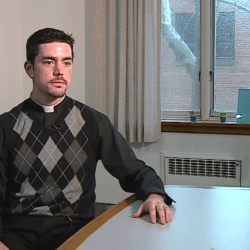A reader sent me the following e-mail, which is an important follow-up on this post regarding married priests:
I have a mentally ill son. He has been difficult to deal with since he was 3, and has been hospitalized twice since he was 15 (he’s 17 now). Our home life is very difficult because of his problems — behavior problems, problems trying out new medicines, problems getting him to attend school, and more. We have had to take him to hours and hours of therapy, much of which did not work, and we spent countless hours looking for therapies, schools, programs, doctors, hospitals, etc. People who are not below the poverty level receive very little help, it is entirely up to them to make all arrangements and pay all bills. We owe thousands of dollars in medical bills, although we have health insurance and a middle-class (not affluent) income. While things are fairly normal when our son’s health is good, when it’s bad we cannot make any firms plans at all — everything is contingent on whether or not he is safe to be by himself. The toll that it takes on our own moods, energy level, and ability to deal with anything else is enormous. And our son is not violent. Families with mentally ill children who are violent endure attacks, often unpredictable, against even the youngest members. And depending on where they live, there is nowhere for violent children to live but their own homes.
How would a parish take on our family if my husband were a priest? Yes, we are an extreme example –but we are real. You never know when a mental or physical illness or a severe accident will consume a family. Protestant ministers can quit ministry to take other jobs. Many of them are only part-time, sometimes unpaid ministers. Those that are well-paid are generally from affluent, large churches that tithe.
It is all very well to think about a married priest dealing with the average problems of an average, happy family. But there are other kinds of families too — many of them struggling with mental or physical ailments that don’t come from bad parenting or even bad genes. Sometimes these things strike out of the blue (there is no history of mental illness on either side of our families). Practical reasons are not the only, or best, reasons to embrace or reject priestly celibacy. But that doesn’t mean they aren’t important.
I’m sure there must be married clergy out there who have some insight from personal experience.
Thoughts?












